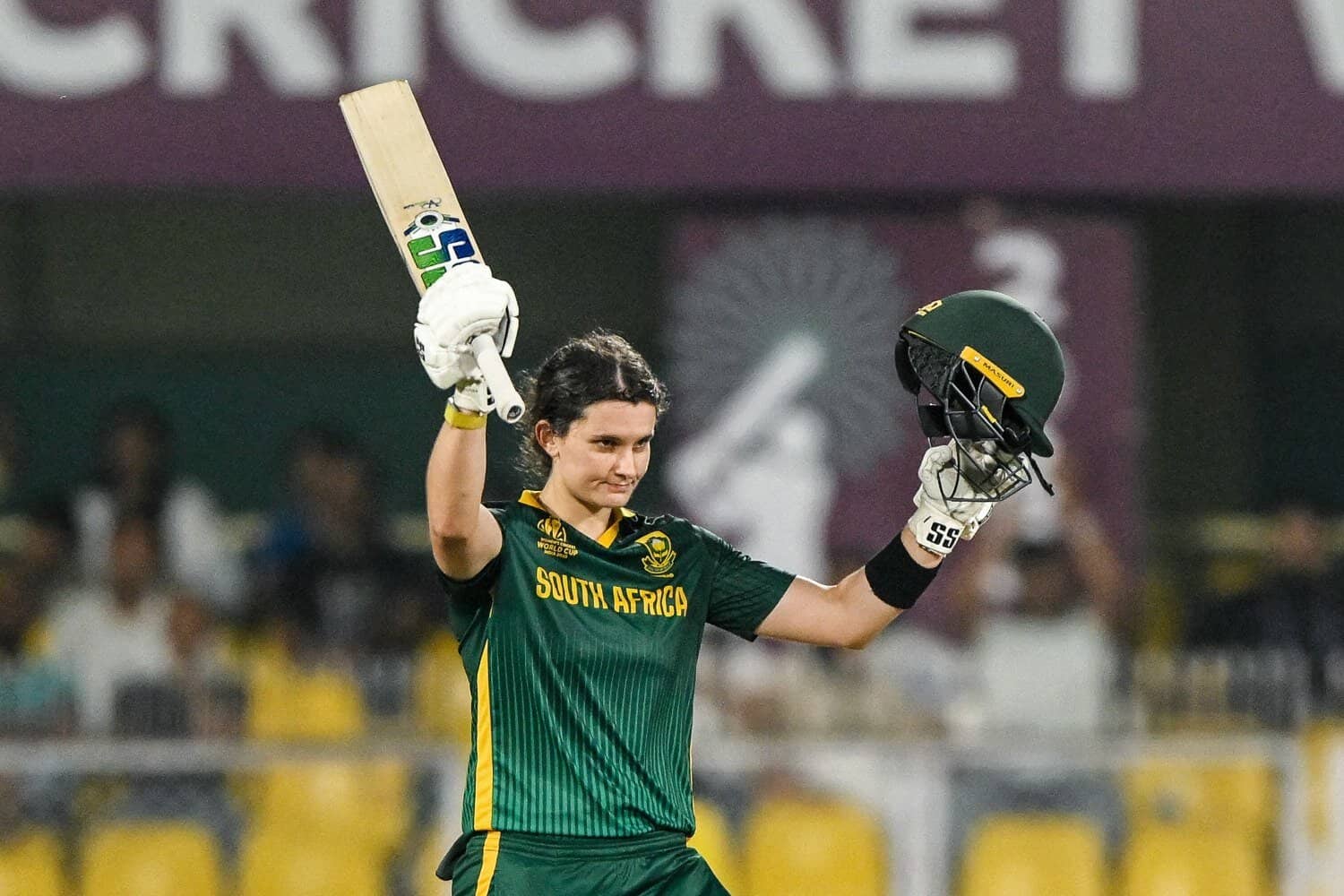In a cathartic night for South African cricket, the Proteas women stunned England by 125 runs in the Women’s Cricket World Cup semifinal, earning a historic first appearance in an ODI World Cup final. It was not just a win, it was a release, a response to years of near misses and a group stage humiliation that had many doubting their mettle.
Two names defined the evening, Laura Wolvaardt and Marizanne Kapp. One wielded the bat with silken authority, the other scythed through England with fierce precision, and together they authored a statement that echoed far beyond Guwahati.
Wolvaardt masterclass lights up Guwahati
Captain Laura Wolvaardt was the heartbeat, delivering a towering 169 off 143 balls that glued the innings together and launched South Africa to 319 for 7. It was her tenth ODI century, a knock studded with 20 fours and four sixes, the third highest score by a South African woman in an ODI and the foundation for the second highest team total recorded in a Women’s World Cup match.
Wolvaardt set the tone with crisp drives through the covers, then shifted gears in the closing overs with a flurry to the leg side that bent the contest to her will. She held the line-up steady, then accelerated, and by the time she holed out with two overs remaining, the damage to England’s hopes was complete.
Her words afterward were as calm as her batting had been clinical. We identified early that it was a decent wicket, so wanted to keep going, she said. I wanted to go until the 40th over and then, while I was there, thought I might as well try to whack a few. The simplicity of that plan, paired with flawless execution, separated this semifinal from the heartbreaks of the past.
Tazmin Brits provided assurance at the top, scoring 45 from 65 in a 116-run opening stand that blunted England’s new-ball threat. Once Brits departed to Sophie Ecclestone, the middle overs belonged to a composed partnership between Wolvaardt and Kapp, their 72-run stand for the fourth wicket adding vital thrust when the innings could have stalled. Chloe Tryon’s 33 not out kept the finishing kick intact, turning a strong total into a formidable one.
England did land a punch with Ecclestone, who returned 4 for 44 and briefly slowed the momentum. Yet Wolvaardt refused to yield, nursing the innings, then pressing the accelerator, a captain batting like a metronome, then like a hammer. The scoreboard pressure that followed would become England’s undoing, a reality that was clear the moment Kapp took the new ball.
Kapp tears through England’s top order
Marizanne Kapp bowled with intent and clarity, and England never recovered. Her opening burst was devastating, Amy Jones was bowled with the second ball of the chase, and Heather Knight followed, playing on to leave England reeling. When Ayabonga Khaka tempted Tammy Beaumont into a drive and Sinalo Jafta pouched the edge, England were 3 for 1, their top three gone for ducks, and the chase already in tatters.
There was a brief reprieve for England when Kapp left the field with cramp, a window that Nat Sciver-Brunt and Alice Capsey tried to prize open. They rebuilt, they rode their luck, and at 63 there was a chaotic sequence when a chance went down at long-on and Sciver-Brunt was nearly run out on the return throw. Even then, the sense lingered that South Africa only needed one opening.
Capsey reached a half-century, then miscued Suné Luus to Nadine de Klerk at mid-off. Momentum tilted again, and when Kapp returned, she found the decisive edge. Sciver-Brunt’s 64 ended with an outside nick that Jafta clung onto, Sophia Dunkley followed in similar fashion, and Charlie Dean was next, feet rooted, feathering behind to hand Kapp a fifth. A hat-trick ball came and went, Sophie Ecclestone survived that delivery, but the end felt inevitable.
It arrived through relentless pressure. Ecclestone later fell to Nonkululeko Mlaba, slog-sweeping into the hands of Annerie Dercksen, Danni Wyatt-Hodge’s resistance ended for 34 when she found substitute Tumi Sekhukhune in the deep, and Nadine de Klerk sealed it by removing Linsey Smith for 27 in the 43rd over. England were all out for 194, South Africa winners by 125, and Kapp walked off with career-best figures of 5 for 20.
Voices that reveal the night
Wolvaardt, named Player of the Match, understood the weight of the moment and the scars that made it meaningful.
It’s very special. Everyone is really excited. Having lost to this opposition in two previous editions in the semis, it really hurt the group, so we’re really pleased to get the win tonight.
She reflected on the dream within the performance too.
It still feels a bit unreal. It’s the sort of thing you dream about, scoring a hundred in a World Cup, and in a knockout game. It’s a special day.
There was also a nod to the platform that set up the night, We knew the start would be crucial. Taz and I have been strong at the top, and when we bat well, it feeds off to the rest of the team.
For England, there was honesty and perspective from Nat Sciver-Brunt.
We have come a long way since the summer. A different side since then and have learnt a lot about ourselves. This will hurt but hopefully, in time, we can take the learnings from it and move forward. It is really exciting where we can go but to beat the best teams, you have to be at your very best.
Her words carried grace, a recognition that on this night the better side played with clarity and conviction.
Turning points that swung the semifinal
The first blows were brutal and immediate. Kapp’s twin strikes with the new ball, Jones bowled then Knight playing on, cracked England’s confidence. That early carnage, compounded by Khaka removing Beaumont, effectively split the chase open within minutes.
The chance on the boundary at 63 was a moment England needed to turn the tide. A dropped catch and an almost calamitous run-out in the same play encapsulated a jittery chase. It was a reprieve that kept the game alive for a time, but not a turning of the tide.
Suné Luus prised out Capsey on 50, and from there Kapp’s return closed the door. The removal of Sciver-Brunt for 64 was the fulcrum. From hope to collapse in a few well-directed deliveries, that was the story England could not rewrite.
A night of redemption for the Proteas
This win carried context that made it burn brighter. The Proteas had been beaten by England at this same hurdle in the last two 50-over World Cups, and in this edition they had been skittled for 69 in the group stage in a ten-wicket defeat. To beat the same opponents now, and to do it with such authority, was a statement of growth and steel.
There was robust structure to the performance. An opening stand of 116 ensured stability, Wolvaardt’s command set tempo, Kapp’s middle-overs surge added impetus, and Tryon finished with composure. On the other side of the ball, Kapp’s new-ball menace, Khaka’s support, Luus’s timely intervention, Mlaba’s sharp strike, and de Klerk’s composure at the end, it added up to a complete team display.
It was also a reminder of the balance required to win knockout cricket. Big runs from a leader, backed by precise, hostile new-ball bowling, and fielders who held their nerve when it mattered most. The emotional history between these teams only heightened the sense that the Proteas were pushing through something bigger than a single match.
What comes next for South Africa
South Africa’s reward is a place in Sunday’s final in Mumbai, where they will face the winner of the other semifinal between hosts India and the world’s top-ranked side, Australia. The immediate takeaway is confidence, not only because of the margin, but because of how different disciplines clicked in harmony.
Wolvaardt’s authority at the top, now backed by tangible silverware stakes, gives the batting order a clear anchor. Kapp’s spell, a career-best, signals a bowling attack capable of striking early and often against any opposition. This is the template the Proteas sought for years, and here it arrived when the pressure was at its peak.
The stage is set for a final that will test nerve as much as skill. Whatever comes in Mumbai, this night in Guwahati already stands as a landmark, the first South African team to reach an ODI World Cup final, a barrier broken with the style and heart of a side that trusted its plan and trusted its leaders.
Scoreline and key figures
South Africa posted 319 for 7, then bowled out England for 194, sealing victory by 125 runs with more than eight overs to spare. Wolvaardt top scored with 169, Brits made 45, Kapp added 42 off 33, and Tryon finished unbeaten on 33. Ecclestone led England’s attack with 4 for 44.
Kapp’s bowling figures, 5 for 20 from seven overs, framed the chase and finished it. Early wickets of Jones and Knight, support from Khaka to remove Beaumont, Luus’s crucial strike to dismiss Capsey for 50, and the final touches from Mlaba and de Klerk, every component fed into a result that felt emphatic from start to finish.
Why this mattered to a nation
It mattered because the story had been heartbreak for too long. It mattered because direction changed under pressure, and because a team often labeled brave but unlucky finally turned promise into proof. In the space of one night, the Proteas went from hopeful contenders to finalists, carried by a captain’s masterpiece and an all-rounder’s fire.
As the celebrations began and the dressing room filled with smiles, the tone of the quotes told their own truth. Relief, pride, belief. The Proteas have made history, and they have done it with a performance that will be remembered whenever South African cricket speaks of courage under lights.






